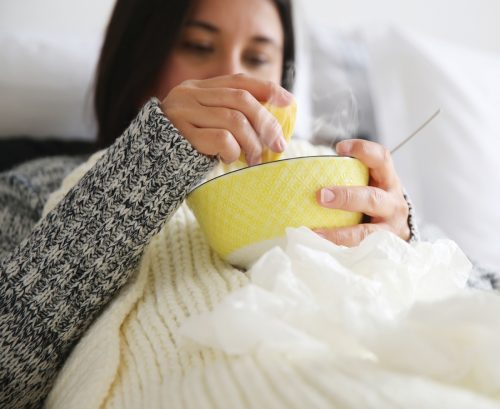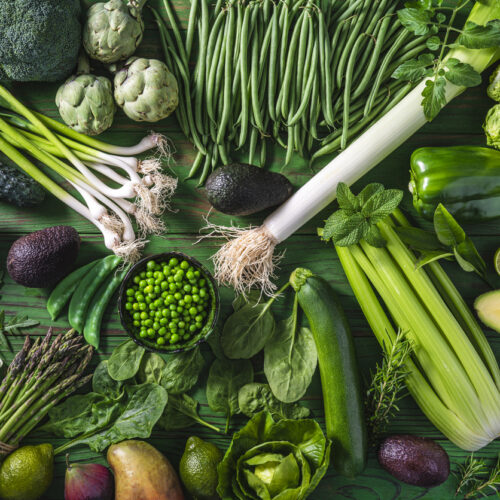
By supporting our immune system we can give ourselves the best chance at weathering the winter season without succumbing to seasonal sick bugs.
If you’re heading into winter wondering if you’re going to get sick and have to change plans due to coughs, colds and the flu, then we’ve got some good news for you. Having a strong immune system is something we build up over time, but there are also a few quick fixes you can try to help you stay well this winter.
What is our immune system?
Our immune system is a network of cells, tissues and organs that work together to keep out anything foreign to the body that may harm it. In winter these harmful substances may be the viruses that cause chest infections, coughs, sneezes, colds and flus.
Our immune system starts with our skin, a physical barrier protecting our insides. Mucous membranes in our mouth and nose are another important part of the system. Cells in our blood stream and tissues and organs including our lymph glands, tonsils, adenoids and bone marrow complete the immune system our body has set up to protect us.
Why do we get sick more often in winter?
Both here and overseas it’s well established that hospital admissions rise during the colder winter months.
We might expect this effect to be more pronounced in our colder regions but that’s not the case.
It’s thought that when the colder nights hit, poor house insulation and heating offsets the potential benefit of living in a warmer area.
Colder weather does seem to increase the number of respiratory (breathing) illnesses. And cold winter air is also a known trigger for asthma attacks. Some viruses thrive more in colder winter temperatures, which means there are, indeed, more around in winter that cause the flu, coughs and colds.
Vitamin D plays an important role in maintaining a healthy immune system and lower levels of vitamin D have been found in people with severe colds. The key to getting enough vitamin D is enough sun exposure. In winter months our vitamin D levels can naturally drop because we’re getting less sun. Combining potentially lower vitamin D levels with an increase in cold-causing viruses means that our immune system may indeed be performing at less than peak strength during winter.
Keeping your windows shut and the heaters on in winter may also be making you sicker, rather than keeping you well.
A US study looked at a how the Influenza A Virus could be affected by humidity and air flow. Virus levels were lower with increased air flow and a more humid environment.
Another study from China found that less fresh air coming into buildings could contribute to higher risk of respiratory disease. So, keeping the windows shut in winter may make you more at risk of sickness, rather than less.
Food cures put to the test
If winter is the time that we’re all susceptible to getting sick, what can we do to help prevent that?
Everyone has their favourite winter wellness recipe to keep away coughs and sneezes. But is there any science supporting these favourite remedies?
Does vitamin C really stop my cold sooner?
To reduce chronic disease risk Australian and New Zealand guidelines have a daily suggested dietary target (SDT) for vitamin C of 220mg for men and 190mg for women. One orange and one kiwifruit a day provide around 140mg daily.
Taking an orange to work each day, or chewing vitamin C supplements may seem like a great idea to keep winter colds away. Making this part of your daily routine may cut the length of time and severity of your cold. But taking a vitamin C supplement when you’re already sick is likely to make no difference at all.
If you’re very physically active or at risk of having low vitamin C stores (for example if you’re a smoker, have limited fruit and vege intake or a malabsorption condition) then you may benefit most from a regular vitamin C supplement or extra vitamin C-containing foods over winter.
Should you really feed a cold and starve a fever?
Feeling unwell often means you lose your appetite. This is thought to be a way that the body protects itself. Studies suggest that fasting when the cause of your infection is bacterial could be beneficial, but not if your infection is viral. Many coughs and colds are viral so feeding a cold does seem to be the right approach.
Fasting has been shown to help reduce inflammation, which often accompanies both colds and fevers. But an increase in body temperature with a fever means you sweat more, losing fluid.
Dehydration can stop the immune system from working properly so it’s important to have fluids as a minimum when you have a fever.
Dehydration also means the mucous membranes in your nose and throat dry more easily. And while this may seem like a nice thought when your nose is dripping with a cold, it’s important to keep these membranes moist so your body can more easily remove the virus from your system.
So, unless you know whether it’s a bacterial or viral infection causing your cold or fever, the answer seems to be feed both. At least make sure you’re drinking plenty, even if you have a sore throat.
Is lemon, honey and ginger the best drink to help my cough and cold?
Nothing says “winter warmer” more than the flavour combination of lemon, honey and ginger. But is there something more to this delicious drink than just making us feel good?
A hit of vitamin C is what the lemon gives to this drink. Juicing one lemon yields about 27mg of vitamin C. On its own that’s not enough to meet our daily target, but combine it with an orange and a kiwifruit and we’re meeting the recommendations.
A systematic review found honey to be just as effective as common over-the-counter cough remedies for children and adults – but remember not to give honey to children under the age of one as it may contain a bacteria that can cause small infants to get very sick. Honey is high in antioxidants and has anti-inflammatory properties, especially New Zealand’s favourite manuka honey.
Ginger, similarly to turmeric, is known for its anti-inflammatory properties in addition to anti-microbial properties that may help stop our cough or cold.
However, we’re not entirely sure just yet how much ginger to put in your drink. It looks like there may be something in this winter warming drink that may help your cough or cold.
Will my turmeric latte keep my immune system strong?
Is there more than just the colour of sunshine in your golden latte to make you feel better in winter?
Curcumin is the active ingredient in turmeric that has antiinflammatory properties. But is there enough turmeric in your latte to keep your cold under control?
Most recipes for homemade turmeric lattes or smoothies call for a 3cm chunk of fresh turmeric, or ¾ teaspoon dried turmeric.
Although the amount of curcumin in turmeric varies, there’s around 200mg curcumin in 1 teaspoon dried turmeric. Studies looking at the anti-inflammatory properties of curcumin have investigated different doses but, as yet, there’s no recommendation for how many turmeric lattes you’d need to drink to keep your cold at bay. There also may be lower amounts of turmeric in ready-made turmeric latte powders.
How to keep the winter blues at bay
What can we do right now to keep the coughs and sneezes from ruining our winter plans?
-
Eat plenty of fruit and vegetables
Fresh (or frozen) vegetables and fruit provide us with important vitamins, minerals and phytonutrients that can help keep our immune system strong.
-
Don’t miss out on fibre
There’s evidence that prebiotic fibres can benefit the immune cells that live in our gut. Making sure we get plenty of vegetable, legume and grain fibres helps keep our gut healthy.
-
Keep active outside
Being active can be important for our mental health, with serotonin (the body’s own happy drug) increasing with regular activity. Outside activity in winter will also give us a vitamin D top-up.
-
Wash your hands
Adhering to basic hygiene when those around us are coughing and sneezing can help keep the transmission of bad bugs to a minimum. These days, kids are taught to cough into their elbow rather than their hands to limit the spread of germs.
-
Keep the air flowing
Open windows and doors, when you can, to reduce germ transmission in our houses.
-
Stay at home if you’re sick
No one is indispensable so if you’re sick, stay home, especially if you work in an open-plan office.
Supporting your immunity all year round
Our immune system is for life, not just for winter. Here’s how we can care for our immune system all year round.
Follow a Mediterranean-style diet
This has been shown time and time again to be best for our gut health, weight, diabetes and cardiovascular risk, which can all impact the wellness of our immune system. Following a Mediterranean-style diet means focussing on vegetables and fruits, in addition to grains, legumes, nuts and seeds, smaller amounts of fish, chicken and red meat, and using olive oil instead of butter.
Drink plenty of fluid
Keeping hydrated helps our immune system by boosting our skin health, mucous membranes and lymph fluid.
Be sun-smart
This helps us top-up our vitamin D in summer months without risking sunburn.
Mind your mental health
Both short- and long-term depression can stop our immune system working effectively. Taking what steps we can to support our mental health and resilience can help our immune system.
Article sources and references
- Anton SD et al. 2018. Flipping the metabolic switch: understanding and applying the health benefits of fasting. Obesity 26:254-68https://www.ncbi.nlm.nih.gov/pubmed/29086496
- Baldi M et al. 2013. Winter hospital admissions and weather types in the Auckland region, researchgate.net/ publication/228736356https://www.researchgate.net/publication/228736356_Winter_hospital_admissions_and_weather_types_in_the_Auckland_region
- Bogdanov S. et al. 2008. Honey for nutrition and health: a review. Journal of the American College of Nutrition 27:677-89https://www.ncbi.nlm.nih.gov/pubmed/19155427
- Fischetti M. 2014. Fact or Fiction? Feed a cold and starve a fever. Scientific American January 3, 2014https://www.scientificamerican.com/article/fact-or-fiction-feed-a-cold/
- Gosai A & Salinger J. 2006. How is climate linked to respiratory infections in Auckland? niwa.co.nzhttps://www.niwa.co.nz/publications/wa/vol14-no4-december-2006/how-is-climate-linked-to-respiratory-infections-in-auckland
- Heijnen S et al. 2016. Neuromodulation of aerobic exercise—a review. Frontiers in Psychology 6:1890https://www.ncbi.nlm.nih.gov/pubmed/26779053
- Johnston CS et al. 2014. Vitamin C supplementation slightly improves physical activity levels and reduces cold incidence in men with marginal vitamin C status: A randomized controlled trial. Nutrients 6:2572-83https://www.ncbi.nlm.nih.gov/pubmed/25010554
- Mashhadi NS et al. 2013. Antioxidative and anti-inflammatory effects of ginger in health and physical activity: review of current evidence. International Journal of Preventive Medicine 4:S36https://www.ncbi.nlm.nih.gov/pubmed/23717767
- Oduwole O et al. 2018. Honey for acute cough in children. Cochrane Database of Systematic Reviews 4https://www.cochrane.org/CD007094/ARI_honey-acute-cough-children
- Ran L et al. 2018. Extra dose of vitamin C based on a daily supplementation shortens the common cold: A meta-analysis of 9 randomized controlled trials. BioMed Research International ID1837634https://www.hindawi.com/journals/bmri/2018/1837634/
- Schley PD & Field CJ. 2002. The immune-enhancing effects of dietary fibres and prebiotics. British Journal of Nutrition 87:S221-30https://www.ncbi.nlm.nih.gov/pubmed/12088522
- Sun Y et al. 2011. In China, students in crowded dormitories with a low ventilation rate have more common colds: evidence for airborne transmission. PloS one 6:e27140https://journals.plos.org/plosone/article?id=10.1371/journal.pone.0027140
- Tabrizi R et al. 2019. The effects of curcumin‐containing supplements on biomarkers of inflammation and oxidative stress: A systematic review and metaanalysis of randomized controlled trials. Phytotherapy Research 33:253-62https://www.ncbi.nlm.nih.gov/pubmed/30402990
- Tayyem RF et al. 2006. Curcumin content of turmeric and curry powders. Nutrition and Cancer 55:126-31https://www.ncbi.nlm.nih.gov/pubmed/17044766
- Wang A et al. 2016. Opposing effects of fasting metabolism on tissue tolerance in bacterial and viral inflammation. Cell 166:1512-25https://www.ncbi.nlm.nih.gov/pubmed/27610573
- Yang W & Marr LC. 2011. Dynamics of airborne influenza A viruses indoors and dependence on humidity. PloS one 6:e21481https://www.ncbi.nlm.nih.gov/pubmed/21731764
www.healthyfood.com










